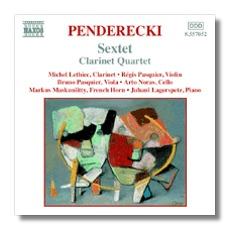
The Internet's Premier Classical Music Source
Related Links
- Penderecki Reviews
- Latest Reviews
- More Reviews
-
By Composer
-
Collections
DVD & Blu-ray
Books
Concert Reviews
Articles/Interviews
Software
Audio
Search Amazon
Recommended Links
Site News
 CD Review
CD Review
Krzysztof Penderecki

Chamber Works
- Sextet for Clarinet, Horn, Violin, Viola, Cello & Piano (2000)
- Clarinet Quartet (1993)
- Three Miniatures for Clarinet & Piano (1956)
- Divertimento for Solo Cello (1994)
- Prélude for Solo Clarinet (1959)
Michel Lethiec, clarinet
Régis Pasquier, violin
Bruno Pasquier, viola
Arto Noras, cello
Markus Maskuniitty, horn
Juhani Lagerspetz, piano
Naxos 8.557052 DDD 67:48
This is a less familiar side of the Polish master's output. Primarily known for his large-scale orchestral and choral works, Krzysztof Penderecki (b. 1933) nevertheless has found time to express himself with a few works of substance in the chamber medium. The Sextet, composed in 2000, probably will be regarded as one of Penderecki's most important chamber works. There's something Lutosławski-like about its two-movement structure: the opening Allegro moderato seems to preface the succeeding Larghetto, which is more than twice the first movement's length. Throughout, the writing is typical of the composer's late period: the musical language is contemporary (not avant-garde) but the brooding, dramatic content is expressive almost to the point of late Romanticism. Penderecki's writing for the horn, in particular, creates a powerfully elegiac mood.
The Clarinet Quartet (1993) and the Divertimento for Solo Cello (1994) are less expansive. Emotionally, the former work is typical of the composer's work from the 1980s and 90s: dark, chromatically lyrical, and shot through with bitter humor. The latter work, written for Mstislav Rostropovich, is less personal, although it is finely wrought, with the famous cellist's strength and personality kept in mind.
The Three Miniatures (1956) are skilled juvenilia, influenced by Bartók and Lutosławski. The brief Prélude for Clarinet (1959) is a journey through an isolated land. Curiously, the booklet notes mention Three Miniatures for Violin and Piano, also composed in 1959, but these do not appear on the CD! Where could they have gone?
The performances, recorded in Finland by French and Finnish musicians, are highly capable, and the engineering is good – perhaps a little too echoey.
Copyright © 2003, Raymond Tuttle




















